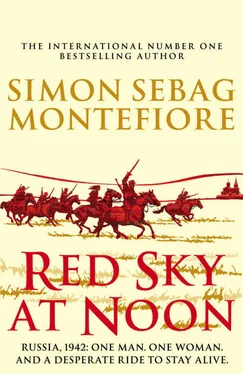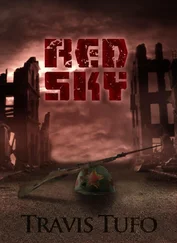Melishko looked embarrassed but the ex-prisoners were unmoved. The things they had seen in the Gulags, or in the great retreats of 1941, had accustomed them to the malignant buffoonery of Soviet bureaucrats.
‘Thank you, very useful, Comrade Ganakovich,’ Melishko said, stepping forward again. The men could feel his disdain for the Party hack – and they shared his disgust. ‘Good luck, bandits! I will be there with you! Long live Stalin!’
‘Excuse me, penal-colonel,’ the secret policeman Mogilchuk interjected. ‘There’s one more thing. Captain Ganakovich will enlighten the men.’
‘They need to rest and tend the horses. Haven’t my bandits listened to us enough?’ objected Melishko.
‘Not quite,’ said Mogilchuk. ‘Proceed! Bring out the prisoner!’
A hush fell over the Shtrafbat as the NKVD men, machine guns sloping ready, pushed a figure in front of them. Benya saw at once it was young Polyak and he was sobbing. God, prayed Benya, give the boy strength! But there was no God there to help him now, no God at all in their lives.
When Polyak reached the cluster of officers in the middle of the manège, Mogilchuk made a gesture and they brusquely stopped him. Polyak swayed but the guards held him up.
‘Lads, pals, if the generosity of the Great Stalin is abused with trickery, there can only be one result,’ declared Ganakovich portentously. A creature of the Communist Party, Ganakovich liked to present himself as a leader with the popular touch. Benya knew that if they were dancing the kalinka , Ganakovich would jump into the centre of the circle and make his fancy leaps. If the men were taking a drink, Ganakovich, slapping backs and massaging arms, would buy shots and tell stories of his dubious exploits – his heroics in the grain campaign of ’32, the time he met Molotov, the day he defeated a Trotskyite cell in his factory, and of course the girls whom he had conquered. Only his upturned snout and piggy eyes hinted at his self-glorification. He swallowed loudly. ‘I hand you over to our Chekist knights of the Revolution.’
Flanked by his NKVD soldiers, Mogilchuk stepped forward. ‘Anyone who deliberately wounds themselves to avoid battle or win redemption will receive the Eight Grammes. Penal-Sergeant Polyak was sentenced to serve in this penal battalion for retreating without orders during the battle of Kiev. Last night, hearing our deployment was imminent, this coward went to elaborate lengths to fake sickness, by cutting himself.’
‘It was a real cut!’ Polyak wailed.
‘Silence, prisoner!’ snapped Mogilchuk. ‘He was denounced by one of the medical team. After an investigation, following this order from Stavka, he is hereby condemned to the Vishka, the sentence to be carried out immediately and in front of the battalion.’
An intake of breath.
‘Shtrafniki, my lads, my muckers!’ cried Ganakovich, making no effort to conceal his excitement. ‘Volunteers from the ranks to execute the prisoner?’
Melishko stared at his boots. It was so hot that Benya found it hard to breathe. He remembered how he had once heard his own death sentence. He stared at the boy: Mitka Polyak, we talked often; if you were so afraid, why didn’t you come to me?
The men swayed slowly, shifting foot to foot, flies buzzing.
‘I repeat,’ cried out Ganakovich. ‘Volunteers to execute the prisoner!’
Silence.
Ganakovich raised his pistol again. ‘Or must I do it myself?’
Benya and Prishchepa glanced at each other. They lived in a Russia dominated by Ganakoviches but it was ironic that in a regiment of cutthroats, no one wanted to fire a shot.
‘I will shoot the boy!’ said a voice. Spider Garanzha had raised his hand.
‘Step forward, Penal-Private Garanzha,’ said Ganakovich.
Moving with his customary slowness, relishing the strength of his cyclopean limbs and the terrifying effect of his face, Garanzha stepped up to the front of the battalion and crossed his hairy arms. A giant swollen spider, a birdeater perhaps; Benya could see how he got his nickname.
‘Who else? We need one more. Come on, men. Who’s it to be?’
‘Count me in!’ It was Smiley, a Chechen gangster whom Benya had met on the atrocious sea voyage to Kolyma.
‘Come forward Penal-Private Ulibnush,’ blared Ganakovich, using Smiley’s real name.
‘Proceed to your positions,’ said Mogilchuk, who believed that saying ‘proceed’ frequently granted him a patina of authority. ‘Or you’ll face the tribunal yourself.’
Smiley moved sideways with the loose, dancing gait of one who has lived beyond the law all his life, who has never slept without remaining half awake, never crossed a road without watching his back, who was always running from one heinous thing towards another.
Polyak cast a glance at these two cutthroats and started to shake.
‘Please get this over,’ whispered Benya.
Prishchepa was praying, touching his icon necklace. When Benya looked around, he saw that many of the Cossacks in the battalion were also moving their lips silently.
Ganakovich handed out the Nagants. Both executioners took the pistols as if born with guns in their hands.
‘On your knees, prisoner!’ cried Ganakovich with a gulp.
The guards turned Polyak away from the men and then let him drop to his knees. Benya saw his lowered freckly neck flush bright red. There’s sometimes as much character in a man’s neck as in his face, Benya thought. Polyak started to breathe greedily, tossing his head back, gulping air. He was no longer a human, just an animal seconds from death, like a cow in the abattoir, straining at the hands of his captors.
Garanzha and Smiley cocked their pistols. First Garanzha and then Smiley fired into Polyak’s neck, the shots merging into one. When Benya opened his eyes Polyak lay on his side. Mogilchuk drew his own pistol and, wincing with the strain – no gunman he – fired the control shot into Polyak’s temple. Benya noticed that Melishko had never looked up.
‘Good work! Medics,’ called Ganakovich.
Two nurses rushed forward with a stretcher and rolled the body on to it. Then the battalion medic, whom Benya knew well from the Camps as Dr Kapto, knelt beside Polyak, touched his neck, and nodded at Ganakovich.
‘Prisoner deceased,’ he said.
‘Thank you, doctor,’ Ganakovich replied, glaring at the men. ‘Lesson learned, lesson learned, eh lads?’
Benya walked alone out to the training arena and leaned on the white railing. The night was rosy and soft, a true soomerki, one of those perfect summer nights when it was so hot that no one could sleep and the air had the texture of creamy velvet; it was a night, thought Benya, for a boulevardier to walk a girl he hopes to kiss. The horizon flashed; the guns boomed, seemingly ever closer; sometimes he heard the roar of engines as tanks detrained at the station and moved towards the front. Somewhere, across the Don, thousands of Russians were fighting for survival; and somewhere very close, Polyak’s body was being dumped into an unmarked grave, dug in this rich black earth. Had they shot the boy pour encourager les autres, to instil discipline in this unreliable crew, Benya wondered, or had the imminent transfer to the front simply terrified Polyak into wounding himself?
The solitude was a tonic to Benya. One of the torments of the Camps and of the army was the loss of personal space. He craved the luxury of loneliness. That is why he adored the space of the steppes. He often walked out here at night, to smoke, to dream, and often he remembered his daughter who lived with her mother, Benya’s estranged wife. Were they safe in Brussels or Paris or had they made it to Madrid or London? His daughter must be a young woman now – he had not seen her for years… Then there were his parents. Odessa had fallen to Hitler’s allies, the Romanians, who were said to have unleashed such havoc that most of the Jews of the city had been slaughtered in the streets. Could such a thing have happened to them? Or had they escaped eastwards?
Читать дальше












